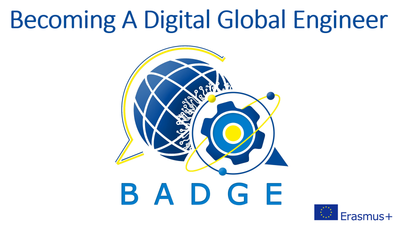BADGE – Becoming a Digital Global Engineer

Intellectual Output
BADGE – Becoming a Digital Global Engineer
Project 2019-1-FR01-KA203-063010 (167 512 512)

BADGE – Becoming a Digital Global Engineer
Project 2019-1-FR01-KA203-063010 (167 512 512)

After studying this lesson on writing minutes, you will be able to
The word ‘minutes’ possibly dates back to the 16th century and may be taken from the Latin ‘minuta scriptura’ meaning small writing. In classical Latin, the writing was done in capitals or block script, but this changed in the Middle Ages when lower case letters were introduced, possibly in order to save space, paper, and ink. This ‘small writing’ is thought to have been used for rough drafts of letters, notes or instructions for servants, as well as to record the proceedings of meetings of societies, assemblies, etc. The latter use continues to this day. Nowadays, minutes are usually a summary of the discussions and decisions taken during meetings, to be read by the participants afterwards as a reminder of what took place, and also by those who did not attend the meetings.
Meeting minutes serve as a reference document recording the important decisions made in a meeting and the action to be taken as a result of those decisions. Minutes are generally written in a concise way and include only that information relevant to the points and tasks discussed in the meeting. As a result, they are written in a neutral/formal style and tend to be quite factual, not including opinion or speculation.
There are three types of meeting minutes:
1) Action minutes – these are the most common form. They focus on the meeting outcomes, i.e. what decisions have been reached and what actions should be taken as a result.
2) Discussion minutes – these give a fuller picture as to how decisions are made, thus they tend to be longer and more detailed. However, all the information should relate to the topics discussed in the meeting. Discussion minutes are taken when the decision-making process is important and may come under scrutiny at a later date. Discussion minutes also record the actions decided upon in the meeting.
3) Verbatim minutes – these are an exact recording of everything said in the meeting by all the participants. As such, verbatim minutes are long and extremely detailed. However, this version of minutes is not common, and may only be necessary in a legal or political context, or in cases when rather contentious issues must be addressed.
With the advent of online meetings, web-conferencing and note-taking applications, meeting minutes have become more collaborative. Meeting participants can now add their notes or comments to the same document. This may be done in real time or once the document has been distributed to the meeting participants. The latter may occur if information relevant to the planned tasks becomes available after the meeting has finished. Feedback is usually expected from the meeting participants as to whether the minutes are an accurate representation of the meeting proceedings. This may simply be a comment directly to the distributor, or participants’ feedback may be expected at a subsequent meeting.
Since meeting minutes should be accurate and to the point,
the language used is usually impersonal and direct, often including
abbreviations or acronyms and technical jargon. Passive forms of verbs are
commonly used (e.g.: Team was updated on project status), along with
reported speech (e.g.: JT confirmed that health and safety training had
commenced) and ellipsis, i.e. when words are omitted from a sentence, but the
meaning of the sentence can still be understood (e.g.: Site manager already
consulted about problem). Finally, in terms of structure, most meeting minutes
follow a similar pattern to the example of action minutes shown below.
Note that minutes will often include a list of attendees, as well as the names
of those unable to attend the meeting. If the attendees are mentioned later in
the main body of the text, the initials of their names are usually used.
Express RailConstruction Meeting Meeting minutes Date: 22/09/22 Time: 10.30am Location: Brighton office
Chair: Jack Knight, Director of Construction (JK) Attendees: Sue Kielty, Project Manager (SK)
Mark Stone, Construction Manager (MS) Chris Wentworth, Installation Manager (CW) Jane Astley, Design Manager (JA) Kelly Jones, Environmental Manager (KJ) Andy Black, Regional Construction Planner (AB) Sandeep Raj, Lead Project Engineer (SR)
Apologies: Rebecca Thomson, Installation Manager Sam Foster, Signalling
Topic 1: Safety Issues - Northwood site · Poor ground conditions have resulted in a number of injuries to workers clearing vegetation and debris. · Injurious plants have been identified on said site. Action: 1) All workers must wear adequate PPE and first aid arrangements must be in place. (MS) 2) Work zones to be clearly identified and staff briefed on safety procedures. (MS) 3) Exclusion zones to be set up around hazards such as injurious plants, and only designated staff to work in these zones. (MS)
Topic 2: Environmental Issues – Northwood & Greenford sites · Environmental Management Plan does not currently include disposal of waste materials from sites. Action: 1) EMP to be revised. (KJ) 2) Site managers to be briefed on waste disposal guidelines once EMP finalised. (MS)
Topic 3: Design changes – Knottworth – Purlington track · Knottworth Local Authority has refused planning permission for proposed route. Action: 1) Alternative routes to be considered. (AB & JA) 2) Design team to come up with alternative proposal by 01/11/22. (JA)
Any other business: None
Next meeting scheduled for: 14/11/22 - 11.00, Brighton office. Minutes submitted by: JK |
|
· come under scrutiny – be carefully and critically examined · contentious – controversial, likely to cause argument · to address sthg – direct attention to sthg · with the advent of – with the introduction of · omitted – left out, excluded |
https://english.stackexchange.com/questions/114951/why-are-the-notes-or-protocol-of-a-meeting-referred-to-as-its-minutes retrieved 14.04.20
https://meetingtomorrow.com/blog/how-to-prepare-minutes-for-a-meeting/ retrieved 15.04.20
https://www.meetingdecisions.com/blog/how-to-write-meeting-minutes retrieved 15.04.20